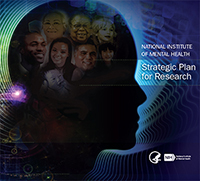Archived Content
The National Institute of Mental Health archives materials that are over 4 years old and no longer being updated. The content on this page is provided for historical reference purposes only and may not reflect current knowledge or information.
New NIMH Strategic Plan Aims to Focus, Accelerate Mental Health Research
National Institute of Mental Health plan will help guide funding
• Press Release

Against a backdrop of rapid scientific advances and dramatic changes in the landscape of mental health care, the National Institute of Mental Health (NIMH) has issued a new Strategic Plan for Research. Informed by the successes and challenges of recent years, the new plan updates the strategic objectives of its 2008 predecessor with the aim of balancing the need for long-term investments in basic research with urgent mental health needs.
“A strategic plan can identify the most important problems and identify areas of traction,” said NIMH Director Thomas R. Insel, M.D. “This update of our strategic plan is a commitment to take a fresh look at our horizons so that we can refine priorities and energize our path of discovery.”
According to recent estimates, mental illnesses account for 21.3 percent of all years lived with disability in the United States. An estimated 9.6 million American adults suffer from a serious mental illness in which the ability to function in daily life is significantly impaired. Furthermore, over 41,000 Americans died in 2013 from suicide, more than twice the annual mortality from homicide or AIDS. Changing these statistics depends not only on continued effort in areas in which there have been dramatic advances, but in less fully explored areas, such as the mechanisms by which environmental influences alter brain and behavior, as well as in research to improve and broaden access to health care services.
To go forward, the plan has revised the original four high-level strategic objectives as follows:
- Define the mechanisms of complex behaviors.
- Chart mental illness trajectories to determine when, where, and how to intervene.
- Strive for prevention and cures.
- Strengthen the public health impact of NIMH-supported research.
These four objectives form a broad roadmap for the institute’s research priorities over the next five years, beginning with the fundamental science of the brain and behavior, and ending with public health impact. The overall funding strategy is to pursue long-term objectives by supporting investigator-initiated proposals based on scientific opportunities, while using targeted funding announcements to address near-term goals.
A diverse community of stakeholders helped review and provide comments on the draft update of the plan. These include the National Advisory Mental Health Council and the NIMH Alliance for Research Progress, a gathering of the major foundations and mental health research advocacy groups. A revised draft plan was published for public comment through an announcement on the NIMH website and a Federal Register Notice from Nov. 12, 2014, to Dec. 11, 2014. In total the institute received nearly 600 comments from individuals, groups, and organizations, as well as from the National Advisory Mental Health Council.
The NIMH Strategic Plan for Research is available in print and can also be read online.
About the National Institute of Mental Health (NIMH): The mission of the NIMH is to transform the understanding and treatment of mental illnesses through basic and clinical research, paving the way for prevention, recovery and cure. For more information, visit the NIMH website.
About the National Institutes of Health (NIH): NIH, the nation's medical research agency, includes 27 Institutes and Centers and is a component of the U.S. Department of Health and Human Services. NIH is the primary federal agency conducting and supporting basic, clinical, and translational medical research, and is investigating the causes, treatments, and cures for both common and rare diseases. For more information about NIH and its programs, visit the NIH website .
NIH…Turning Discovery Into Health®
